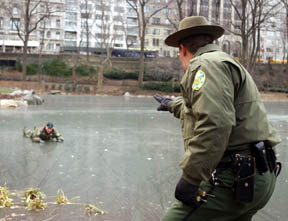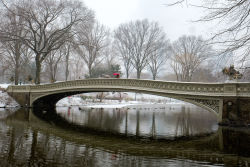Central Park
The Daily Plant : Monday, January 27, 2003
PARKS & RECREATION STAGES ICE RESCUE SIMULATION

On Thursday, January 16, Parks & Recreation staged a dramatic ice rescue at the pond in Central Park to encourage New Yorkers to stay away from thin ice on City ponds and lakes. During the winter months, parks are the perfect place to explore snowy terrain, but while ponds and lakes may appear frozen, venturing onto them can be extremely dangerous and can cause potentially fatal accidents.
Armed with life rings, ropes, special ladders and ice picks, dedicated PEP Officers, Urban Park Rangers and even two horses, braved the cold with Parks & Recreation Commissioner Adrian Benepe and Deputy Commissioner Kevin Jeffrey to warn New Yorkers of the dangers of ice and to show what they could do in case of an emergency. "We encourage everyone to come out to the parks and enjoy winter activities, but our urgent message is: Stay off of the ice on our lakes and ponds," said Commissioner Benepe. "No one should ever venture out onto a frozen water body, unless they are notified by Parks staff at a specifically designated area that the ice is strong enough for skating."
During the ice rescue demonstration, Ray Brown, Deputy Inspector of the Parks Enforcement Patrol was rescued not once, but twice, on Central Park's Pond. Pete Rosado, Corporal for the Urban Park Service Training Academy used ice picks and a red ladder to rescue Deputy Inspector Brown and later, Dennis Annunziato, Sergeant for the UPS Training Academy, threw a life preserver to the inspector. Recruits from the latest Academy class added the muscle to bring Inspector Brown to shore. To make the simulation even more realistic, Urban Park Ranger Carla Gonzalez even used her radio to report the "incident" to Central.
Determining the strength of ice is a very difficult task, especially for an untrained individual. Ice must be at least six inches thick before it can maintain the weight of a person, and to freeze to the right thickness, the temperature must be well below freezing for weeks. Ice strength is affected by the depth of the water, the size of the water body, the water's chemistry, the distribution of weight on the ice, and local climatic factors. Birds and other animals can weaken the ice with their body heat. Snowfall can also weaken the ice because it serves as an insulator.
Parks & Recreation offers the following Ice Safety Tips to ensure everyone remain safe:
• Never go on frozen waters (unless clearly marked otherwise with official signs).
• Parents and caregivers should make sure children are never unattended near ice.
• If you hear cracking, lie down immediately to try to distribute your weight.
• If you witness someone falling through ice, never attempt to make a rescue by yourself. Call 911 and notify the proper authorities. Be sure to give the exact location and an account of the incident.
To remind people of the dangers of thin ice, Parks & Recreation also posts warning signs along the perimeter of City lakes and ponds in English and in Spanish. Special ladders and ropes are also installed around the edges of city lakes for trained personnel to use in case someone falls through the ice.
Doug Blonsky, Central Park Administrator, Neil Calvanese, Vice President of Operations for Central Park, Alex Brash, Chief of the Urban Park Service, Richard Gentles, Inspector, Parks Enforcement Patrol, and Bob Reeves, Deputy Inspector of the UPS Training Academy also lent their expertise to the press conference. Special thanks to all of the PEP Officers, the Urban Park Rangers and the crew from Central Park for helping to create this informative rescue simulation.
Written by Jocelyn Aframe
QUOTATION FOR THE DAY
"’Twas brillig, and the slithy toves
Did gyre and gimble in the wabe:
All mismy were the borogoves,
And the mome raths outgrabe."
Lewis Carroll
(January 27, 1832–1898)












